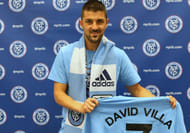New York City FC – it is a name that has been doing the rounds in footballing circles over the past year. A team that will scheduled to start playing only in 2015 was getting a share of the headlines two years prior to that. Not all new clubs begin in such a manner. But this one is different. David Villa and Frank Lampard have already signed up. Some curious fans would have googled the name, before sitting back down and saying, ‘Oh, it’s just those Arabs again.’
Introduction to European Football
Yes, the Arabs are coming. One club and one sponsorship deal at a time, they are slowly climbing up the ladder to the upper echelons of World Football. The first major indication was given when the Abu Dhabi United Group bought Manchester City in 2008. Within days they had made an impact, splashing enough cash to bring Robinho to Eastlands. A couple of managers and many players later, City now stand with two League titles and three domestic cups to show for all the money that Sheikh Mansour put in.
The French capital was up next. In the summer of 2011, the Qatari government’s investment arm announced its purchase of Paris Saint Germain. Their stated aim was to put the city of love on the map of World Football. Noble as it may seem, one may wonder if it is indeed the primary intention; many events off the pitch show that for these ambitious Arab owners, City and PSG are just little pieces on a huge chessboard.
If buying clubs was one way of announcing yourself to the world, sponsorship deals were another. It was Emirates, the official carrier of Dubai, who set the pace with their ‘Fly Emirates’ logo gaining global fame, adorning the jerseys of PSG, Arsenal, AC Milan and the star of them all, Real Madrid. Emirates have had an important relationship with Arsenal, with a long term deal for the stadium naming rights. By now, the word ‘Emirates’ has become quite synonymous with the North London club while ‘Ashburton Grove’ may soon become alien!
Abu Dhabi’s airline Etihad Airways has a similar relationship with Manchester City. The neighbours in Qatar weren’t to be left behind and announced a record deal with Barcelona in 2011. Qatari firms Ooredoo and QNB also have key deals signed with PSG while the partly-Qatari owned sportswear company Burrda supplies the Belgian national team.
Going truly global
It is understandable if the focus is on traditional centres of the game like England, Spain, Italy and France but recent moves have seen Qatar and Abu Dhabi also show an interest in other regions which don’t have a similar football culture. They have been making inroads into places like the US, Canada, Belgium, Australia, Japan and Southeast Asia. It seems that going global was always on their agenda, and it was just a matter of time.
For the Abu Dhabi group, it wasn’t too long before they realised that success at Manchester City wasn’t enough. They have since created the City Football Group, a company that will oversee the global network of clubs that City owns shares in. New York City FC was announced as Major League Soccer’s 20th franchise in May 2013, in a partnership deal between Manchester City and the New York Yankees. 2014 saw two more clubs being added to the list: Melbourne City F.C (formerly Melbourne Heart) of Australia and Yokohama F.Marinos of Japan.
While the ventures in the US and Australia represent a major effort to further spread City as a world brand, City will only have a minority stake in the Japanese club. Yet, it is another important step as the owners look to have a foothold all over the world.
The Qataris have chosen a different method of enhancing their global reach; and it is rather peculiar. In 2012, the little-known town of Eupen in southeast Belgium was earmarked as key for Qatar to make a positive name for itself in the world game. The local football team KAS Eupen, from the Belgian second division, was bought by Qatar’s national sports academy ‘Aspire’, in a deal that surprised many.
The authorities running the academy though had it all planned out well in advance. This anonymous club would be the launch pad for the talented young players that the Aspire Academy had scouted and developed in its centres in Qatar and Senegal. It was something that could always be marketed as ‘Qatar realised the dreams of scores of footballers!’ It would be a massive shot in the arm for Qatar’s image. The officials believed that these players can move on to bigger and better things from there and it could be said that they have been vindicated as one of the players has now signed for FC Barcelona B.
Qatar’s media ambitions
All that has been mentioned so far has to do with clubs and football on the pitch. There is another realm which works off the pitch but is a crucial element of the game today: the media. And it is one field where Qatar has surpassed its rivals in style. The beIN Sports media network has put Qatar in an enviable position globally. Starting out as a pan-Arab channel called Al-Jazeera Sports, the rebranded network now has rights to broadcast major football events in France, the US, Canada, Hong Kong and Indonesia.
Some sources related to the network say that beIN Sports harbours hopes of becoming a Murdoch-like empire in the global sports media. The evidence so far shows that it may happen sooner than later. The Qatari network has brushed aside established competitors such as Fox Sports, Canal+ and ART Sports to gain its current position. At a time when broadcast media has a huge say in the running of the football industry, such a position can come in very handy. It probably helps some more if the the President of PSG, Mr. Nasser al-Khelaifi is also the head of beIN Sports.
The objective
When you have businessmen splashing so much cash and investing so heavily in football, it raises the question: are they in here to make some money? It is always probable but not so in this case. Why? Simple, it’s because none of the moves so far show any signs of making money. Although Abu Dhabi and Qatar have well maintained investment activities that try to move away from total reliance on oil and gas, their interest in football doesn’t fall in line with that. Expenditure has far outstripped income at both PSG and Manchester City.
Yet the owners remain steadfast in adding more and more names and investments to their portfolio, making it clear that dough isn’t what they are after. Quite obviously, it is much more about making a name than money. Analysts point to the term ‘soft power’- influence attained by means of diplomacy, international assistance and cultural exchanges etc. It may be the main reason for the Arab spending spree throughout the World of Football; trying to make through Football what can’t be made from politics.
What are the consequences?
As the rise of the Arabs continues, football fans all over will wonder what the consequences are for the beautiful game. For Paris Saint Germain and Manchester City, it has brought immense success and recognition while for some other clubs, a fear of being left far behind. The injection of large amounts of cash has opened up huge gaps between clubs fighting for titles. The complaints in this regard forced UEFA to come up with the Financial Fair Play (FFP) regulations. Fining the clubs who break the rules may help keep them in check but both PSG and City have already attempted to circumvent the rules.
FFP regulations which state that ‘clubs must not spend more than they earn’ are designed to keep overspending in check. But PSG and City have, as mentioned earlier, announced million dollar deals with firms that are linked to their owners’ respective governments. And so, money from state coffers still finds its way to club accounts, albeit now marked as ‘revenue.’
As for the likes of New York City FC, Melbourne City, Yokohama F.Marinos and KAS Eupen, one can hope that Arab investment will be a positive aspect of their history. It could spell benefits for the local community and also give their youth a route to world fame, all because of the extensive influence of their owners and their network. It is why David Villa signed for New York and will then go Down Under to play for Melbourne till 2015. It is why PSG and Man City visit Qatar and UAE to coach aspiring young footballers. It is why beIN Sports is becoming a leading channel in four continents.
It may also be why a few years from now, a kid from Yokohama will probably make it big on football’s biggest stages, to be the toast of the world. And then he will thank the Arabs.



